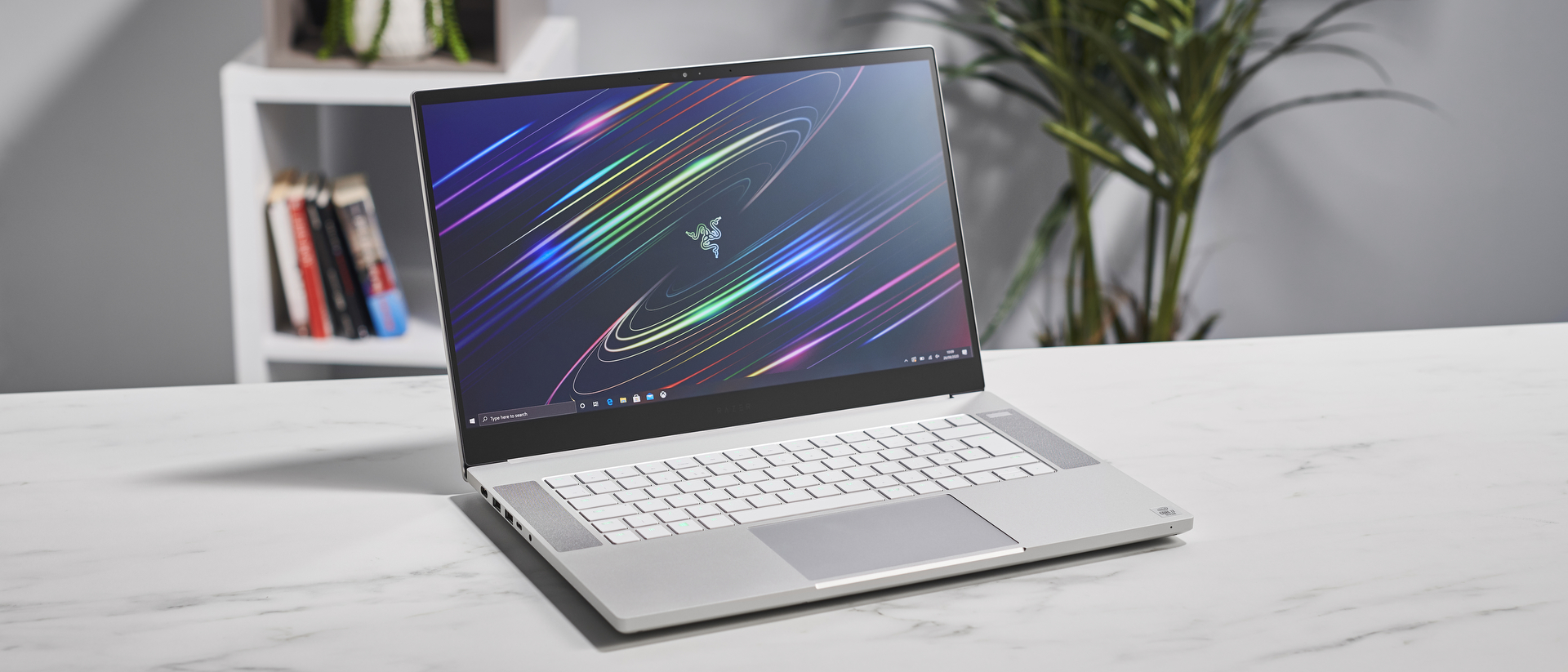TechRadar Verdict
The Razer Blade 15 Studio Edition (2020) is one of the most powerful laptops ever made – and that’s both a blessing and a curse. It means that if you’re after a mobile workstation that can compete with the most powerful desktops to handle complex tasks, like 3D animation, this is a laptop you should consider. However, it also means it’s incredibly expensive, and most people just won’t need the kind of firepower on offer here.
Pros
- +
Extremely powerful
- +
Premium design
- +
Stunning display
- +
Good battery life
Cons
- -
Very expensive
- -
Overkill for many people
Why you can trust TechRadar
Two-minute review
The Razer Blade 15 Studio Edition (2020) is the latest mobile workstation for creative professionals from Razer, a company that's better known for its cutting-edge gaming machines. The new Razer Blade 15 Studio Edition features a gorgeous aluminum design, once again proving that the company knows what it’s doing when it comes to making attractive and desirable products, plus one of the best screens you can get on a laptop, and some of the most powerful mobile tech you'll find inside one.
This includes a new 10th generation 8-core Intel Core i7 10875H processor and the incredibly powerful Nvidia Quadro RTX 5000 graphics card, which, coupled with 32GB of RAM and a 1TB solid state drive (SSD), makes this one of the most powerful laptops on the market today, and one that's aimed squarely at creative professionals who do a lot of very intensive rendering and editing.
So it’ll come as little surprise to learn that not only is the Razer Blade 15 Studio Edition (2020) one of the most powerful laptops around, it’s also one of the most expensive, with a price tag of $4,299.99 / £4,199.99 (around AU$6,000).
That will put it out of the reach of most people, but the level of polish and performance you get here is pretty much unrivaled. We must give particular props to the screen: it's a 4K touchscreen OLED that supports 100% of the DCI-P3 color gamut, and it's bright and vibrant, producing accurate colors.
To make the price slightly more justified, you’re getting the kind of power you’d usually find in a desktop PC, but in a thin and light laptop form factor – and battery life isn’t too bad either, all of makes makes the Studio Edition (2020) pretty much unbeatable as a mobile workstation.
So, the Razer Blade 15 Studio Edition (2020) certainly isn't for everyone. But if you have the budget, and are looking for a powerful mobile workstation that lets you chew through demanding graphical tasks with ease, you won’t find a better laptop in 2020 – and it should prove an excellent investment.
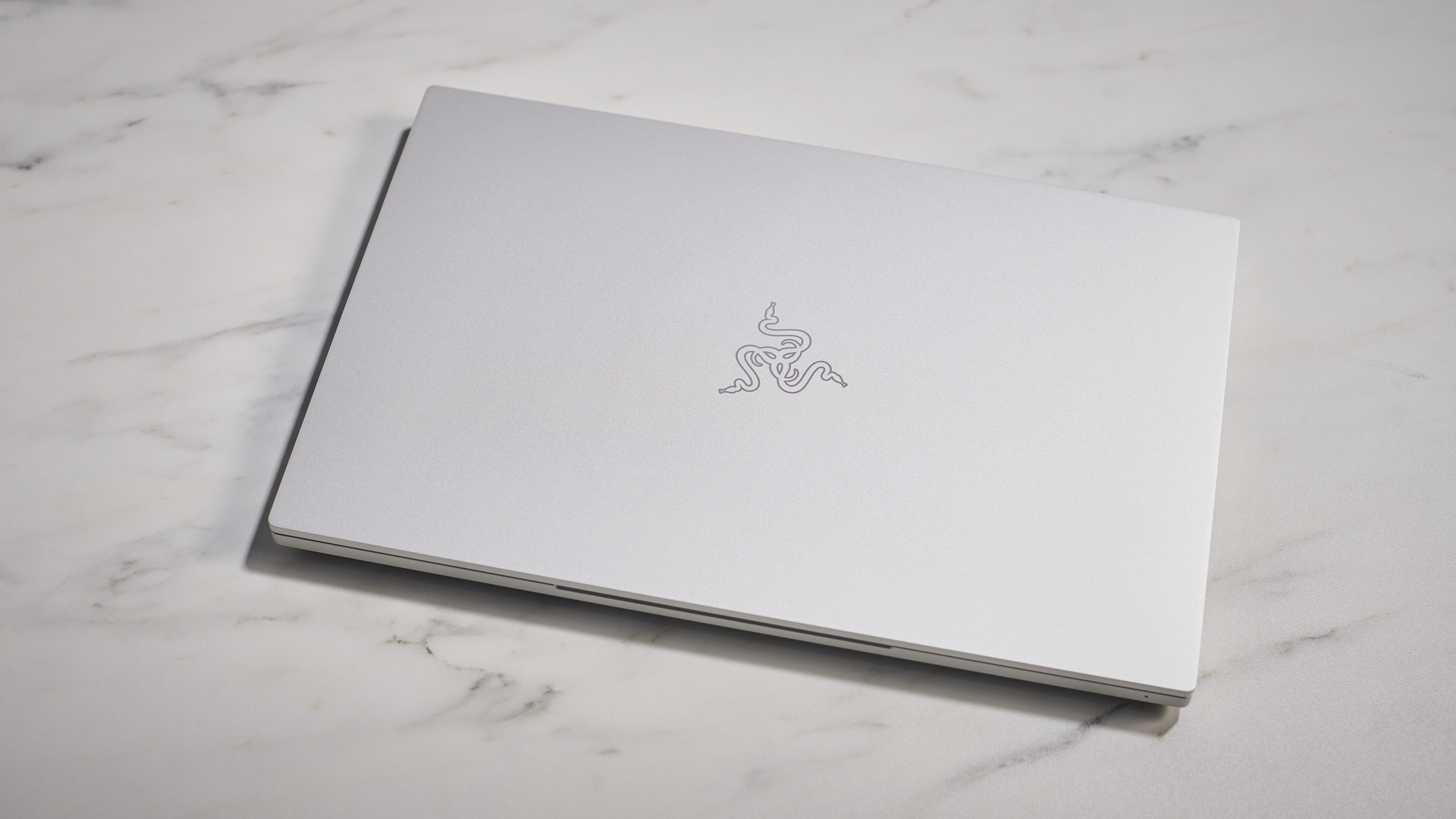
Here is the Razer Blade 15 Studio Edition (2020) configuration sent to TechRadar for review:
CPU: 2.3GHz Intel Core i7-10875H (8-core, up to 5.1GHz with Turbo Boost)
Graphics: Nvidia Quadro RTX 5000 with 16GB GDDR6 VRAM
RAM: 32GB DDR4 (2,933MHz)
Screen: 15.6-inch 4K (3,840 x 2,400) OLED touch
Storage: 1TB SSD (PCIe, NVMe, M.2)
Ports: USB 3.1 Gen 1 (USB-A) x2, USB-C 3.2 Gen 2, Thunderbolt 3 (USB-C)
Connectivity: Intel Wireless-AX201 (802.11a/b/g/n/ac/ax), Bluetooth 5.1
Camera: 720p webcam
Weight: 4.6 pounds (2.09 kg)
Size: 13.98 x 9.25 x 0.78 inches (355 x 235 x 19.9 mm; W x D x H)
Price and availability
The Razer Blade 15 Studio Edition (2020) is available now in most markets, and starts at $4,299.99 / £4,199.99 (around AU$6,000), although some retailers, like Scan in the UK, are selling it for less (£3,698.99 at the time of writing).
Sign up to the TechRadar Pro newsletter to get all the top news, opinion, features and guidance your business needs to succeed!
That’s a huge asking price for a laptop, even a high-end machine designed for creatives. Its main competitor, the 16-inch MacBook Pro, starts at $2,399 (£2,399, AU$3,799) – almost half the price.
However, while the Studio Edition (2020) is much more expensive, it comes with better spec, including an updated 10th-generation 8-core Intel Core i7 10875H processor and Nvidia Quadro RTX 5000 graphics card, both of which will easily outperform the hardware included in the base model of the MacBook Pro 16-inch. It also comes with twice the RAM (32GB) of that laptop, and twice the storage (1TB).
The screen on the Razer Blade 15 Studio Edition (2020) is also an improvement over the MacBook Pro’s, as it’s OLED and offers 4K resolution.
While this does account for the higher price, does it quite make a case for such an expensive laptop? It depends on what you need.
If you’re looking for a computer that can complete rendering tasks, for example, in a fraction of the time it would take a more affordable machine, and is portable, then the high price of the Razer Blade 15 Studio Edition (2020) is far more palatable. Anyone else, however, should look elsewhere – the superb Razer Blade 15 (2020), for example, is ideal for gamers.
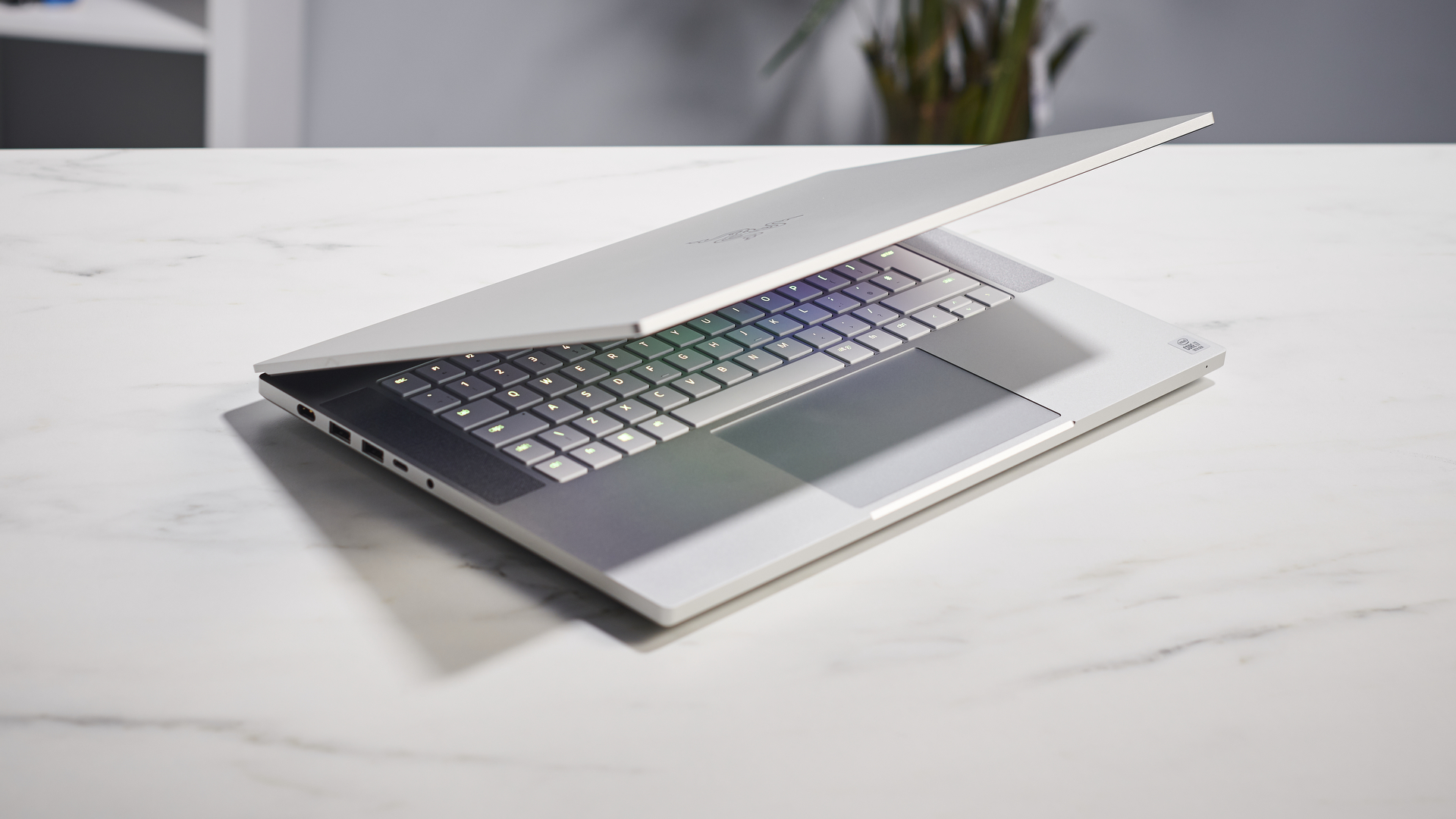
Design
Razer is well known for making good-looking products, and the Razer Blade 15 Studio Edition (2020) is no exception. However, as this is a laptop built for professionals, it does have a more… professional look than its gaming counterparts.
That doesn’t mean it looks boring, however. Its silver metallic body is certainly reminiscent of the MacBook Pro, but with a slightly squarer and chunkier look, and the iconic Razer logo is on the back in reflective silver; it's a minimalist design that suggests this is a laptop that should be taken seriously.
With dimensions of 0.70 x 9.25 x 13.98 inches (17.8mm x 235mm x 355mm) and a weight of 4.85 pounds (2.2kg), the Razer Blade 15 Studio Edition (2020) is impressively thin considering the hardware that's packed inside, although it’s both thicker and heavier than the MacBook Pro 16-inch.
However, that extra size allows Razer to fit in more ports, with a memory card reader, USB-C (Thunderbolt 3), USB 3.2 (USB-A) and HDMI port running along the right-hand side of the body, and two USB-A ports, a USB-C port and headphone jack on the left-hand side, along with a proprietary power port.
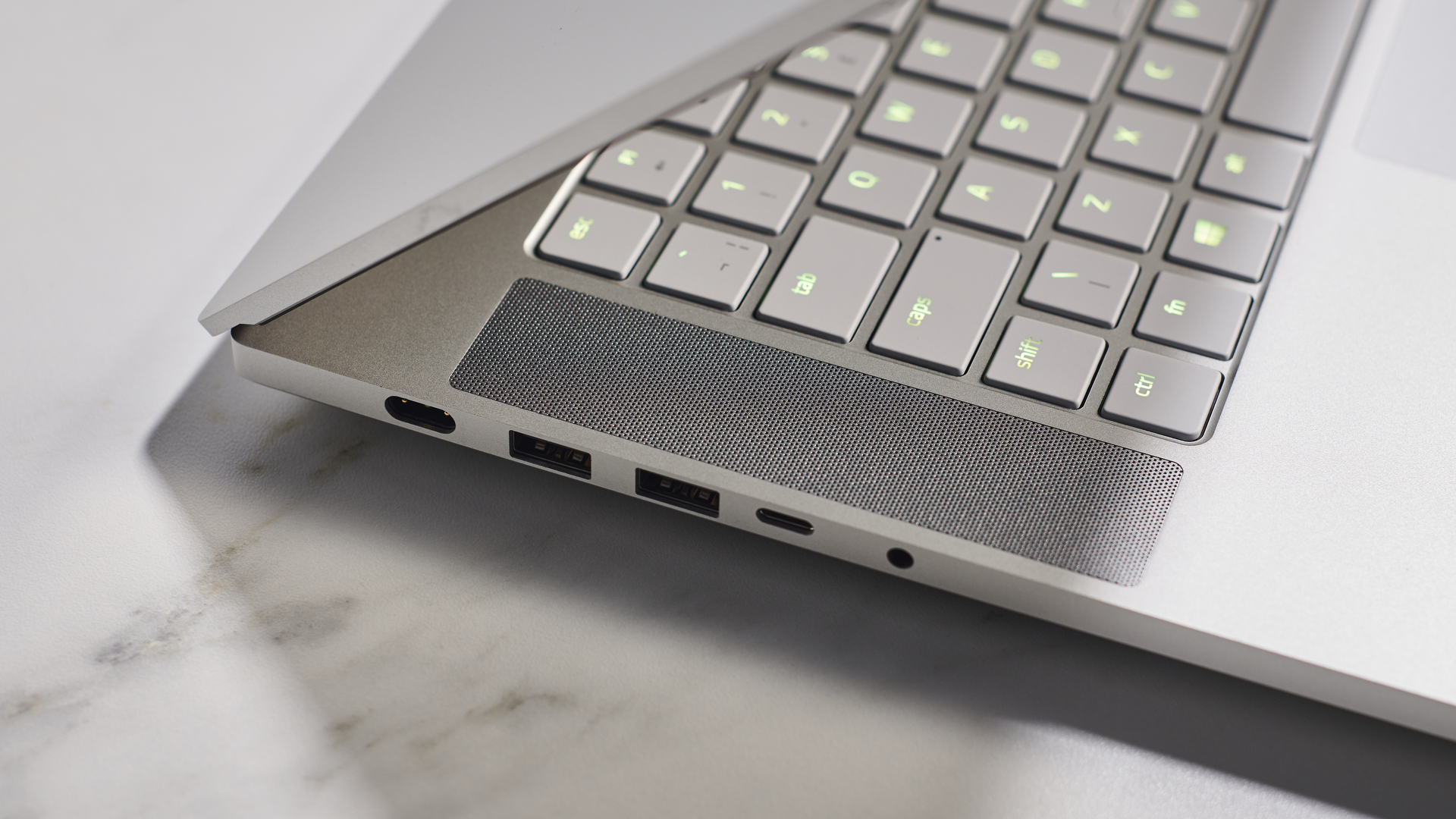
As this is very much a productivity machine we’re pleased to see such a comprehensive array of ports, and for anyone who's been frustrated by the MacBook Pro’s limited port selection (just four Thunderbolt 3 ports) and the requirement for adapters that necessitates, the extra size of the Razer Blade 15 Studio Edition (2020) is a worthwhile trade off.
On opening the Razer Blade 15 Studio Edition (2020) you're greeted with a backlit keyboard, with decent-sized keys that have comfortable travel. The trackpad below the keyboard is large, and again comfortable to use, and there are speakers on either side of the keyboard. There’s also a fingerprint sensor on the right, enabling you to log into Windows 10 quickly and securely.
Then there’s the screen – and what a screen. Not only is it a 4K touchscreen, it’s OLED as well, which means contrast levels are excellent, and colors are bright and vibrant. It looks fantastic straight out of the box, and creatives who require absolute color accuracy, especially video editors, will be pleased to know that it supports 100% of the DCI-P3 color gamut.
It really is a gorgeous screen, and puts even the MacBook Pro’s 16-inch Retina display, itself no slouch, to shame.
Overall, then, the Studio Edition (2020) is a gorgeously designed laptop that screams ‘premium’. The aluminum unibody is sturdy enough to make you confident that you can carry it around with you without worrying about the odd knock, without feeling too bulky or heavy. Throw in the ‘Mercury’ white finish, and this is one incredibly nice-looking laptop.
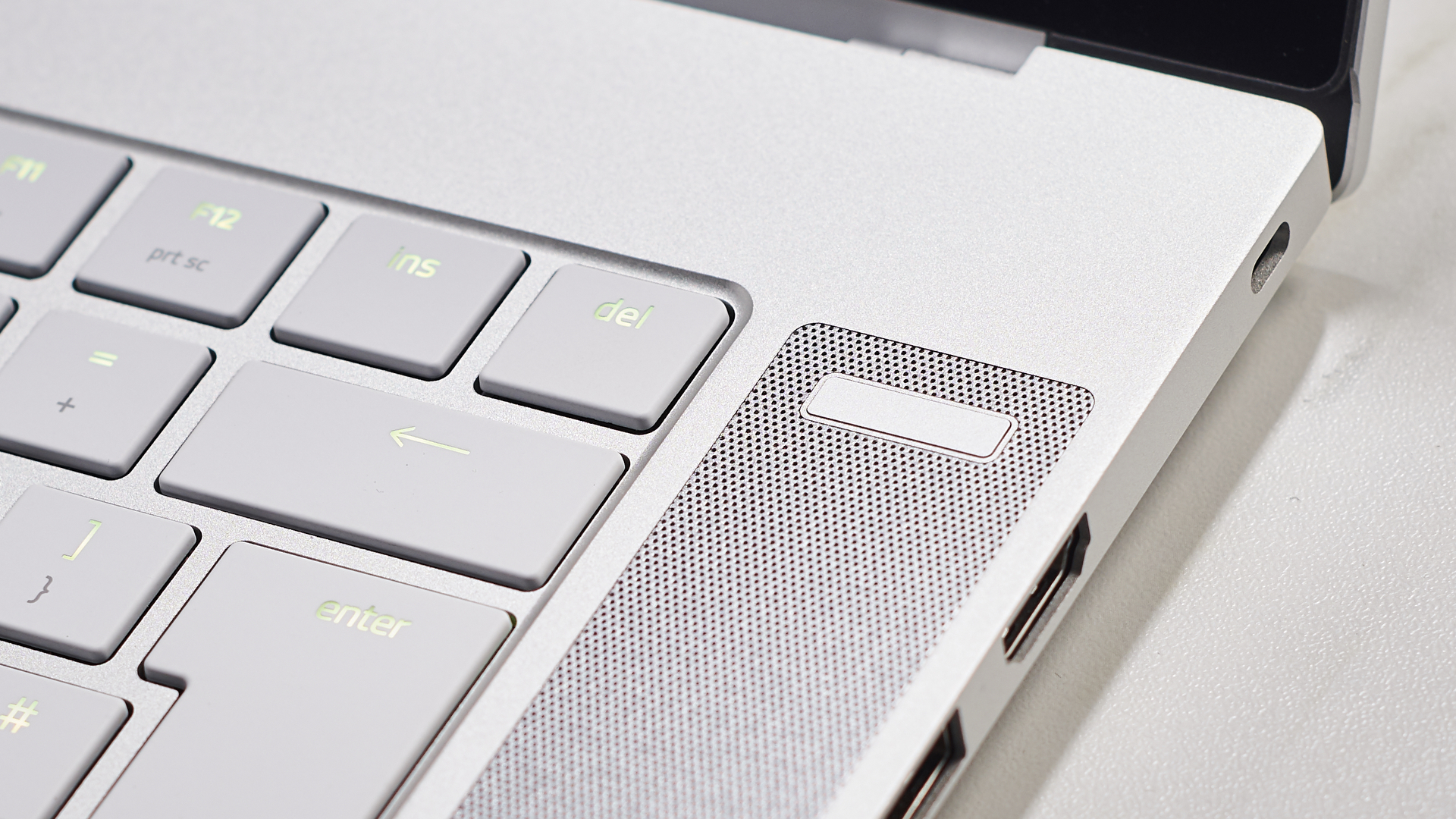
Here’s how the Razer Blade 15 Studio Edition (2020) performed in our suite of benchmark tests:
Cinebench R20 CPU: 2,670 points
3DMark Time Spy: 7,347; Fire Strike: 16,224; Night Raid: 28,867
GeekBench 5: 1,275 (single-core); 5,587 (multi-core)
PCMark 10 (Home Test): 4,961 points
PCMark 10 Battery Life: 4 hours 37 minutes
Battery life (TechRadar movie test): 6 hours 57 minutes
Performance
As we've mentioned, the Razer Blade 15 Studio Edition (2020) is a very expensive bit of kit, but that’s largely justified by the specs. While the 8-core 10th-generation Intel Core i7 processor, plus 32GB of RAM, means this is a powerful laptop that’s particularly adept at multitasking, it’s the professional-grade GPU that makes the Studio Edition a truly formidable pro laptop.
We’re talking about the Nvidia Quadro RTX 5000 GPU, with 16GB of GDDR6 VRAM, which is one of the most powerful GPUs you’ll find in any laptop. It blows past the AMD Radeon Pro 5500M found in high-end MacBook Pros, and means the Razer Blade Studio Edition (2020), when it comes to graphic performance, rivals desktop and all-in-one workstations, like the high-end model of the 27-inch Apple iMac (2020), and the Microsoft Surface Studio 2. These are expensive, and powerful, machines which put the price of the Razer Blade Studio Edition (2020) into better perspective – and they all lack something which the laptop excels in: portability.
So it comes as no surprise to see just how well the Razer Blade 15 Studio Edition (2020) performed in our suite of benchmark tests. It handily beat last year’s Razer Blade 15 Studio Edition, which ‘made do' with a 9th-generation six-core Intel Core i7 processor and Nvidia GeForce RTX 2080 Max-Q GPU with 8GB of GDDR6 memory – and those are still very impressive specs.
We also encoded a one-hour 1080p MKV file to MP4 using the H.264 encoder with surround sound, which took just six minutes and 47 seconds – that same task took a $4,499 / £4,499 / AU$6,849 configuration of the new iMac almost twice as long.
With such impressive performance for strenuous tasks, it should come as no surprise that the laptop handles more rudimentary tasks with ease. Windows 10 positively zips along thanks to the roomy SSD and bags of RAM.
So, yes, the performance of the Studio Edition (2020) justifies the high price tag, as long as you're using it for seriously power-hungry tasks; for lesser tasks, it’s going to be overkill.
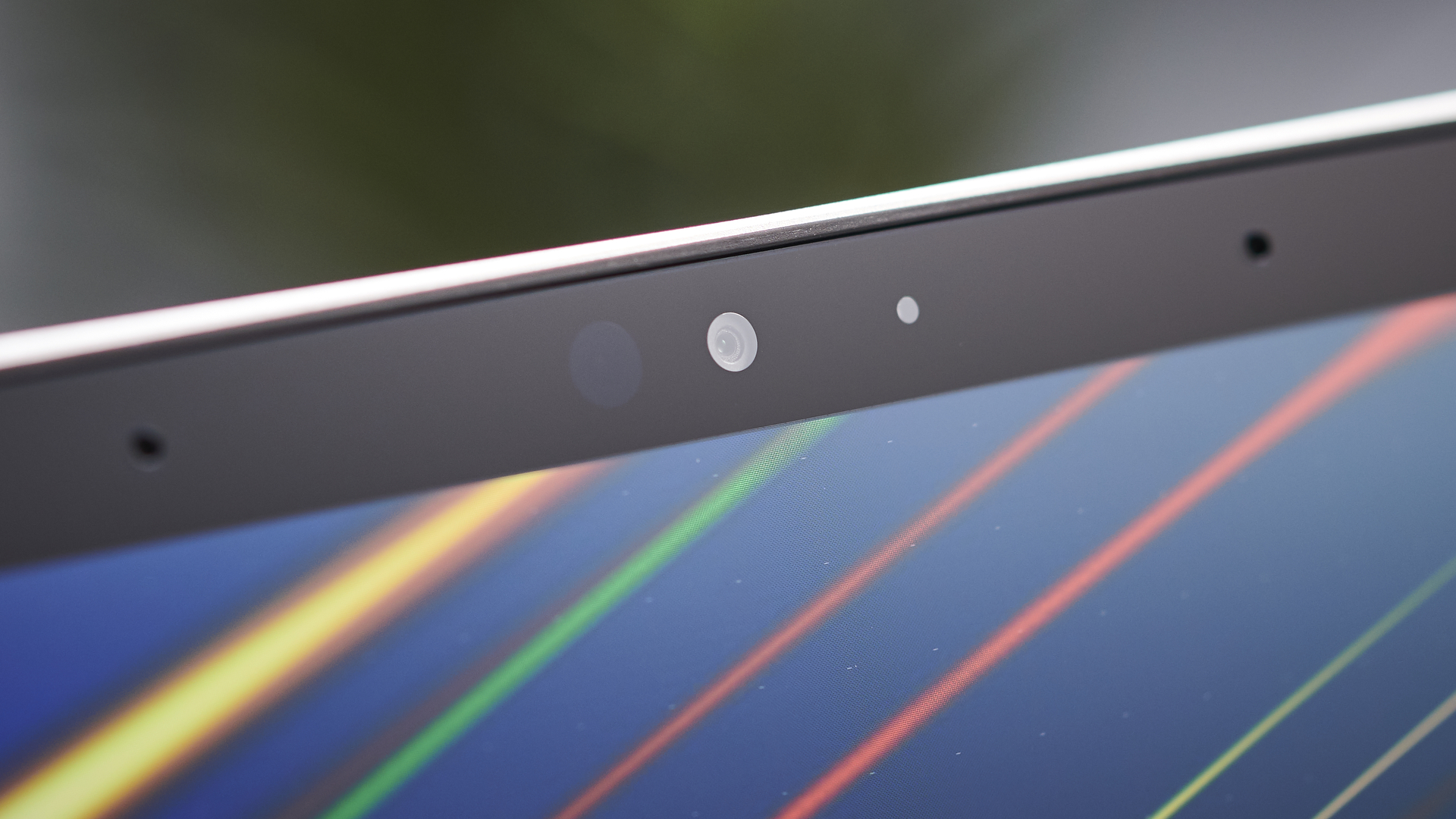
Battery life
It’s generally accepted wisdom that the more powerful the laptop, the shorter the battery life, and usually this is because powerful components require more power. However, modern components are getting more power-efficient, and this has led to laptops like the Razer Blade 15 Studio Edition (2020) being able to keep running for a surprisingly long time without being plugged in.
In our TechRadar battery-life test, for which we play a looped 1080p video until the battery dies, the Studio Edition (2020) lasted just short of seven hours. That’s not bad at all for a laptop like this, and it means that if you're only engaging in lighter tasks the Studio Edition should be able to last you through a longish flight, or a full work day.
However, that’s given the very lightweight task of playing a video file saved locally – and that’s not why you’d primarily be buying the Razer Blade 15 Studio Edition (2020). For more intensive tasks such as document creation, photo editing and video calling, replicated by the PC Mark 10 benchmark, battery life dropped to four hours and 37 minutes. For really intensive tasks, like video editing and 3D rendering, expect the battery to drain even faster.
Still, those aren’t bad numbers, and they're also testament to the improved efficiency of Intel’s 10th-generation CPUs. When you compare the above results with last year’s model (5 hours and 28 minutes, and 4 hours and 9 minutes, respectively, in the same tests), you’ll see that you’re getting, on average, about an hour's extra battery life, despite the more powerful components. Not bad.
No matter how much of an improvement this year’s model is, though, it still can’t compete with the MacBook Pro 16-inch, which lasted a mammoth 11 hours and 41 minutes in our looped video test. If you’re after a pro machine that lasts an entire workday without needing to be plugged in, there’s still no competition.
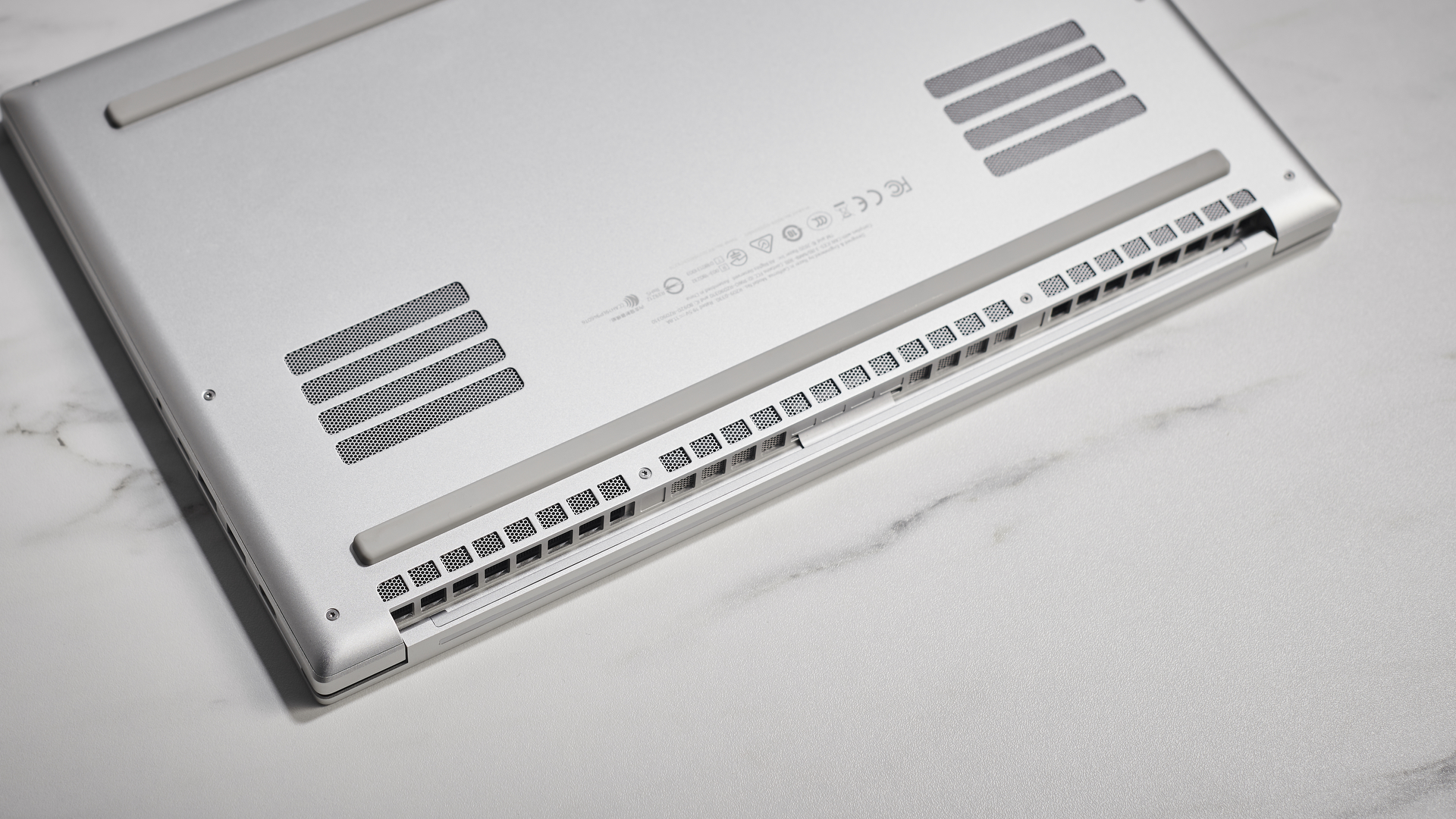
Buy it if...
You need some serious power
The Razer Blade 15 Studio Edition (2020) is an incredibly powerful laptop, with a huge price tag to match, so only consider it if you’re going to need the kind of performance this laptop is offering.
You’re after a MacBook Pro-killer
We love the MacBook Pro 16-inch, but the Studio Edition (2020) beats it in almost every respect. Better screen, better components… you name it.
You want the best screen on a laptop
You really need to see the Studio Edition (2020)’s screen to believe it, and its 4K OLED panel has us wanting to add a ‘chef’s kiss’ GIF to this review. But we’re not allowed to.
Don't buy it if...
You mainly play games
Yes, the Razer Blade 15 Studio Edition (2020) would do a great job of playing games, but despite the Razer name this is not a gaming laptop. There are better, and more affordable, gaming machines out there.
Your budget is tight
It bears repeating: the Razer Blade 15 Studio Edition (2020) is an extremely expensive laptop, and the outlay won't be worth it for less-demanding users.
You don’t need the power
The amount of power on offer here means this is a niche product. There are more affordable laptops that are still plenty powerful enough, and unless you need to render complex 3D scenes, or edit 8K footage, for example, you don’t need the Studio Edition (2020).

Matt is TechRadar's Managing Editor for Core Tech, looking after computing and mobile technology. Having written for a number of publications such as PC Plus, PC Format, T3 and Linux Format, there's no aspect of technology that Matt isn't passionate about, especially computing and PC gaming. He’s personally reviewed and used most of the laptops in our best laptops guide - and since joining TechRadar in 2014, he's reviewed over 250 laptops and computing accessories personally.
